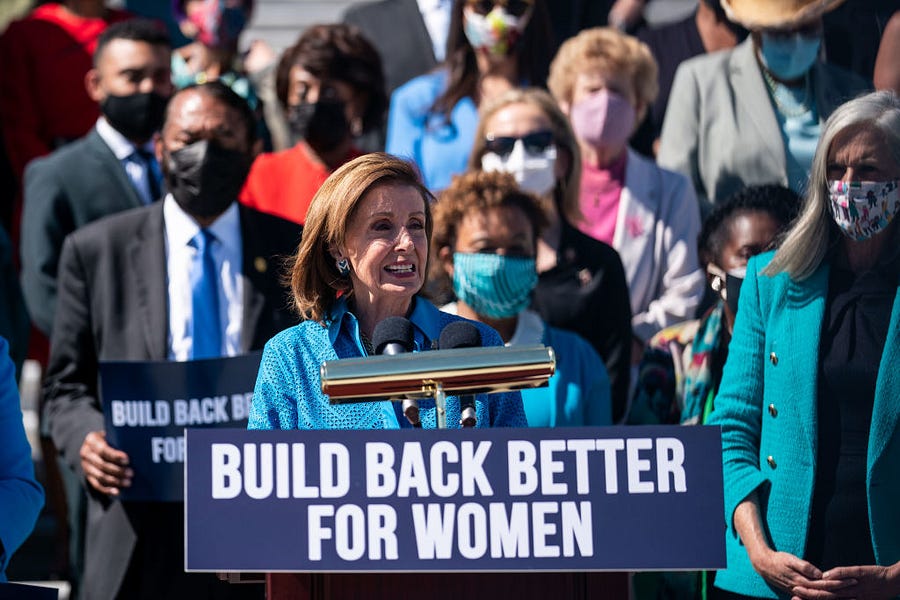REJECTION OF EXTREMES ON ROE MAY DETERMINE MIDTERM COSTS
I have been asked many times what the consequences of overturning Roe v. Wade would be for this fall’s midterm elections, and I have mostly evaded them, mumbling something about Democratic intensity, etc., and how voters for whom abortion is a high-salience issue are already not just engaged, but very likely to be strongly aligned with one party or the other.
And I think that really is all mostly the case. Yes, I know that there are non-negligible numbers of voters for whom the eruption of the issue will be the tipping point in deciding their votes, but this will mostly work among the already activist Democrats. We look at Senate races like Ohio and Arizona and see how Roe will help moderate nominees enforce party discipline on other issues. Basically, as the value of their seat goes up in correlation to the desire to confirm pro-choice justices, progressives would be expected to become be more willing to overlook other issues, e.g. student debt amnesty, social issues, Build Back Better.
But what is becoming clear is that many of the actual consequences will be determined by the radicalism of the opposing sides. Democrats are going bonkers, with the White House encouraging protesters to harass Supreme Court justices at home and Senate Majority Leader Chuck Schumer forcing a doomed-to-fail vote on a bill that wouldn’t just codify the Roe decision but go much further. And that’s even before we get to violent radicalism on the pro-choice side.
Republicans are learning, though, that the impulse to extremism is just as powerful on their side. In Louisiana, the state GOP is wrestling with a bill that would charge mothers who obtain abortions with murder, contradicting a longtime effort on the pro-life side to move away from punishing women and focusing on providers. Republicans running in swing states or swing districts in red states will have to worry that their fellow partisans at the statehouse may put radical ideas on the table—or they might just appear on their own.
I guess I haven’t gotten much past “we’ll see” on the midterm implications of the expected fall of Roe, but at least I’m looking in some more interesting places.
On with the show …
Holy croakano! We welcome your feedback, so please email us with your tips, corrections, reactions, amplifications, etc. at STIREWALTISMS@THEDISPATCH.COM. If you’d like to be considered for publication, please include your real name and hometown. If you don’t want your comments to be made public, please specify.
STATSHOT
Biden job performance
Average approval: 42.2 percent
Average disapproval: 53 percent
Net score: -10.8 points
Change from one week ago: ↑ 1.2 points
[Average includes: Ipsos/Reuters: 42% approve-50% disapprove; Fox News: 45% approve-53% disapprove; CNN/SSRS: 41% approve-59% disapprove; ABC News/Washington Post: 42% approve-52% disapprove; NPR/PBS NewsHour/Marist College: 41% approve-51% disapprove]
Generic congressional ballot
Democrats: 42.6 percent
Republicans: 46.4 percent
Net advantage: Republican Party +3.8
Change from one week ago: Republican Party ↑ 2.0
[Average includes: CNN/SSRS: 42% Democrat, 49% Republican; Fox News: 39% Democrat, 46% Republican; ABC News/Washington Post: 46% Democrat, 45% Republican; NPR/PBS NewsHour/Marist College: 44% Democrat, 47% Republican; Quinnipiac University: 42% Democrat; 45% Republican]
TIME OUT: GREENS NEW DEAL
In the current edition of Garden & Gun, Roy Blount Jr. offers readers a quiz and his own meditations on one of the deepest points of cultural division within our society: collards and kale. “Collards are flat-out, kale is frilly. Collards go with pig meat (or smoked turkey), kale with tahini. Kale is for people who want to get ahead in today’s skinny business world, and it makes a nice garnish. But it was collards that Thelonious Monk wore a sprig of in his lapel. … On the other hand. Dualistic thinking can divide us. And far too much of that is going around. Any day now, we may start seeing bumper stickers saying, ‘Civil War! What Could Possibly Go Wrong?’ After all, collards and kale are both packed with nutrients. Folks have in fact cultivated and cooked both of them, over the years, without making an issue of it.”
BARNETTE BLOWS UP PENNSYLVANIA PRIMARY
New York Times: “After months of a bruising television ad war between Dr. Mehmet Oz and David McCormick and their allies, the relatively shoestring campaign of Kathy Barnette, a conservative commentator showing surprising strength in the polls, will receive a late boost in the Republican primary for Senate in Pennsylvania. The Club for Growth, the pro-business and anti-tax group, began booking television ads on Tuesday on behalf of Ms. Barnette worth $2 million, according to AdImpact, the ad-tracking firm. That sum is more than 10 times what Ms. Barnette’s campaign had spent in total on television to date, and the total pro-Barnette reservations could continue to grow. … Ms. Barnette has … run an unabashedly hard-right campaign, attacking her better-funded rivals as ‘globalists’ on the debate stage… The Club for Growth has not formally endorsed Ms. Barnette, which makes the group’s late intervention all the more politically intriguing. The group did not respond to requests for comment.”
Tie ballgame: Fox News: “Mehmet Oz and Kathy Barnette gain significant ground as support for David McCormick dips, making it a tight three-way race in Pennsylvania’s Republican primary for U.S. Senate. In March, businessman McCormick led television celebrity Dr. Oz by 9 points (24%-15%). A new Fox News survey of Pennsylvania GOP primary voters shows the candidates trading places, with Oz receiving 22% to McCormick’s 20% and political commentator Barnette right with them at 19%. … The race remains wide open as the top three candidates are within the survey’s margin of sampling error, and 18% are undecided on who they will back in the May 17 primary. … Trump endorsed Oz on April 9. The poll finds 37% say the endorsement makes them more supportive of Oz, while 22% say less supportive — with another 37% saying it makes no difference. … Overall, half, 51%, say they could change their mind about their Senate primary vote.”
Hush-hush: Pittsburgh Post-Gazette: “When a Washington Examiner reporter contacted Ms. Barnette’s campaign and asked for details about her past, such as the name of her hometown and where she taught college classes, her campaign said Ms. Barnette ‘keeps her early life as private as possible.’ Ms. Barnette’s campaign also did not respond to multiple requests for an interview from the Post-Gazette over the last two weeks. … Ms. Barnette came into the race with little name recognition or money but gained support among some right-wing groups by campaigning with allies of Mr. Trump’s unfounded conspiracy theories that Democrats stole the 2020 election in Pennsylvania. She was endorsed by state Sen. Doug Mastriano, the GOP gubernatorial front-runner who was subpoenaed by U.S. House Speaker Nancy Pelosi’s Jan. 6 committee for his involvement in the Capitol insurrection attempt. He was recently criticized for attending an event promoted by conspiracy and QAnon believers.”
Big money battles: ABC News: The Ohio Senate GOP primary last week was an early demonstration of Trump’s continued influence over the party, as the Trump-endorsed candidate, Hillbilly Elegy author J.D. Vance, claimed victory with the backing of Trump-aligned megadonors like Peter Thiel and Rebekah Mercer. Yet Vance’s GOP rivals—most of whom also identify as supporters of Trump—were backed by millions of dollars from top Republican donors like Bernard Marcus, Stephen Warren, and Paul E. Singer. All told, the race drew more than $40 million in spending from super PACs and outside groups over the last few months… [The] Pennsylvania Senate GOP primary slated for next week has already seen close to $30 million in spending from outside groups, including from super PACs funded by top Republican donors like Singer, Ken Griffin, and Stephen Schwarzman. … GOP groups have spent more than $20 million to attack Trump-endorsed candidate Dr. Mehmet Oz and support his primary rival David McCormick, filings show.”
Kemp gets backup from fellow governors: Atlanta Journal-Constitution: “Arizona Gov. Doug Ducey is headed to Georgia this weekend for a spate of campaign stops with Gov. Brian Kemp. Two other well-known state executives are right behind him. Ducey will join Kemp at five stops around metro Atlanta on Saturday. Nebraska Gov. Pete Ricketts and former New Jersey Gov. Chris Christie are also expected to rally for Kemp in the final weeks before the May 24 primary. The three are each key players in the Republican Governors Association, which has already shelled out about $5 million to defend Kemp against a challenge from former U.S. Sen. David Perdue. … The RGA is one of Kemp’s most important allies in his effort to snuff out the Donald Trump-backed challenge from Perdue. The pro-Kemp ads amounted to the first time in its history it financed TV attacks during a primary to support an incumbent against a GOP opponent.”
Tillis leads North Carolina GOP effort to oust Cawthorn: Washington Post: “[North Carolina Senator Thom Tillis] isn’t the only powerful enemy Cawthorn has made in his own party. The 26-year-old congressman has, in his few years in politics, sparked public outrage with his support for former president Donald Trump’s efforts to overturn the 2020 election, inflammatory speeches, repeated driving and gun infractions, and even a nude video. But his falling-out with top Republicans in North Carolina and Washington also arose from more humdrum blunders such as neglecting constituent services and insulting party elders, according to GOP officials and operatives in the state. Now, those Republican enemies are openly lining up to take him down. Tillis and many of North Carolina’s top Republicans, including the state’s House speaker and Senate leader, are backing a challenger, state Sen. Chuck Edwards, in next Tuesday’s primary. Tillis has personally raised money for the effort.”
BRIEFLY
Biden nixes new drilling—CBS News
Tom Reed of New York quits House after scandal—Associated Press
L.A. mayor’s bid to be ambassador to India at risk for aide’s alleged misconduct—Politico
Tech mogul Larry Ellison puts $25 million bet on Sen. Tim Scott —Puck
WITHIN EARSHOT: HEY LADIES
“He’s in the bedrooms of all those women telling them good and bad.”—Donald Trump at a rally for Pennsylvania GOP Senate candidate Mehmet Oz, explaining why he believed the celebrity doctor would be the best candidate for the race.
MAILBAG
“What’s the point of these Republican primaries? I feel like there’s a huge difference between these primaries and the 2010s as the tea-party challengers were grassroots and actually challenging the establishment on policies. There is no discernible difference in ideology between Vance/Mandel and McCormick/Oz. Both campaigns are backed by different parts of the establishment and are defined by who can be the most “Trumpy.” There’s no reason for these primaries to be this messy when they basically agree on everything. At least in the Democratic primaries, you can actually see a difference in the platform between the progressives who are challenging the establishment centrists. There’s none of that going on in any Republican primary I can see. Everyone wants to align themselves with Trump’s policies—and the only distancing is the extremely stupid question on “whether or not the election was stolen.” Also, don’t you think it says something about the foundation of the GOP vs the Democratic Party since Hillary Clinton and Joe Biden were both able to thwart their populist challenger and unite their party? Trump beat out everyone in the establishment and got them to fall in line with minimal arm twisting. For all of Nancy Pelosi’s flaws, she’s been way better at managing her caucus than Kevin McCarthy, John Boehner, and Paul Ryan ever were.”—Kim Stephens, Racine, Wisconsin
Ms. Stephens, I hate to tell you, but the better question is: What’s the point of any of these primaries? For openers, let’s investigate the idea that in “the 2010s as the tea-party challengers were grassroots and actually challenging the establishment on policies.” I wrote about this for my Monday column, so the memories are fresh in my head. Looking back on candidates and contests of the period, I don’t see them as primarily policy-oriented, but rather about cultural conflict. Certainly, given the remarkable drift toward heedless spending and the use of government authority in the intervening decade, the policy positions weren’t very deeply held. Primaries seem to me much more likely to encourage ideological divisions, including about meaningless or contrived subjects, than to resolve them. Politicians mostly follow voters, not the other other way around. But politicians do get to, partly, choose the topics of dispute. Social issues and cultural war topics are therefore going to be very attractive to candidates because they are the most reliable way to inflame passions and to seek out the most intense, reliable voters in a polity. I would also remind you that, as was the thrust of my column, Republicans today aren’t chasing Trump as much as they are chasing his voters, many of whom are part of a long populist, nationalist tradition that goes back at least to 1968 in the GOP—and in some ways back to Teddy Roosevelt and the progressives. It’s a slit that basically comes down to whether big government is the problem or whether the application of big government power is the real concern. Moderate technocrats wing back and forth, but the struggle on the right is a fight over the use of power. The cultural revolt within the Republican Party is from those who don’t want a neutral government, but for the government to engineer preferred outcomes socially and culturally. These are big questions and important ones, but they are hiding beneath the personality-driven focus on Trump himself.
You should email us! Write to STIREWALTISMS@THEDISPATCH.COM with your tips, kudos, criticisms, insights, rediscovered words, wonderful names, recipes and always good jokes. Please include your real name—at least first and last—and hometown. Make sure to let me know in the email if you want to keep your submission anonymous. My colleague, the gimlet-eyed Samantha Goldstein, and I will look for your emails and then share the most interesting ones and my responses here. Clickety clack!
CUTLINE CONTEST: OFF TO THE RACES

The Kentucky Derby was a wild one for pundits and forecasters alike. The winner overcame his bleak 80-1 odds and came out on top. Our winner this week is …
“‘Obvious Metaphor’ inches ahead of ‘Rank Punditry’ in the 2022 Caption Derby”—Jack Funke, Poplar Bluff, Missouri
Honorable mention:
“INFLATION takes the lead over AFGHANISTAN DEBACLE, followed by WOKE WASCAL, and last we’ve got LAUGHING HARRIS—ladies and gentlemen, your 2022 Four Horses of the Demopocalypse!”—Darren Ritchie, Kirkland, Washington
Readers should send in their proposed cutline for the picture that appears at the top of this newsletter to STIREWALTISMS@THEDISPATCH.COM. We will pick the top entrants and an appropriate reward for the best of this month—even beyond the glory and adulation that will surely follow. Be hilarious, don’t be too dirty, and never be cruel. Include your full name and hometown. Have fun!
AND THEY STILL SPELLED HIS NAME WRONG
AP: “Actor and activist James Cromwell has gone from ‘Succession’s’ Uncle Ewan to real-life supergluin’—pasting his hand to a midtown Manhattan Starbucks counter on Tuesday to protest the coffee chain’s extra charge for plant-based milk. The 82-year-old Oscar nominee, known for ‘Babe: Pig in the City’ and ‘L.A. Confidential,’ channeled his role as the crotchety, anti-capitalist brother of a billionaire media mogul for the protest organized by the animal rights group People for the Ethical Treatment of Animals. Cromwell sat on the Starbucks counter wearing a ‘Free the Animals’ T-shirt and read a statement denouncing the surcharge for vegan milk alternatives. ‘When will you stop raking in huge profits while customers, animals and the environment suffer?’ he demanded as fellow activists streamed the protest on Facebook. Cromwell glued his hand to the counter, then later used a knife to scrape it off. Police said there were no arrests.”
Chris Stirewalt is a contributing editor at The Dispatch, a senior fellow at the American Enterprise Institute and the author of Broken News, a book on media and politics available August 23. Samantha Goldstein contributed to this report.







Please note that we at The Dispatch hold ourselves, our work, and our commenters to a higher standard than other places on the internet. We welcome comments that foster genuine debate or discussion—including comments critical of us or our work—but responses that include ad hominem attacks on fellow Dispatch members or are intended to stoke fear and anger may be moderated.
With your membership, you only have the ability to comment on The Morning Dispatch articles. Consider upgrading to join the conversation everywhere.